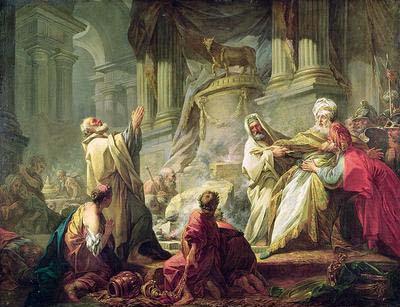Separated Brothers
 “1-2 Kings gives us no such comfort: Christ has been divided in our divisions.”
“1-2 Kings gives us no such comfort: Christ has been divided in our divisions.”
Peter Leithart’s blog is included on the blogroll here, and most readers here read PJL anyway, but his recent posts on Church unity are worthy of flags being flown everywhere possible.
His post Too catholic to be Catholic received a huge response, both positive and negative, which has enabled him to get down to his basis in biblical theology, specifically in the books of the Kings. The Catholic / Orthodox / Protestant divide is no different to the divided kingdom of Israel.
The idea is common on all sides of the divided church that there is in fact no divided church. Some Protestants unchurch Catholics and Orthodox; on this view, Protestants constitute the only true, pure church, and therefore the line that divides Protestants from Catholics and Orthodox is not a line that runs through the middle of the church. It’s instead a line that runs between church (Protestants) and non-church (everybody else). There are forms of the same idea in both Catholicism and Orthodoxy, though since Vatican II the Catholic church has acknowledged that while the church subsists in Catholicism, “many elements of sanctification and of truth are found outside of its visible structure” (Lumen Gentium, 8) and has famously recognized that some outside the Catholic church are “brothers,” albeit separated ones.
From the perspective of 1-2 Kings, this is altogether too sanguine a view of the state of the church. In the history of Israel, the line that divides the northern kingdom of Israel from the southern kingdom of Judah is a line that divides brothers, a line that divides two covenant nations, a line that runs right through the middle of Israel herself. At the beginning of the history of the divided kingdom, Yahweh warns Rehoboam, the son of Solomon, not to attack the northern kingdom and force them back into the Davidic orbit, and in that warning describes Israel as Judah’s “brothers” (1 Kings 12:24). The prophets pick up on similar familial language: Ezekiel describes Jerusalem and Samaria, capital cities of nother and south, as twin sisters (Ezekiel 23). More remarkably, toward the end of the Northern kingdom, after a long history of calf worship and worse, Yahweh holds back from finally destroying Israel because of the promises He made to the patriarchs: “Yahweh was gracious to them and had compassion on them and turned to them because of His covenant with Abraham, Isaac, and Jacob” (2 Kings 13:23).
Sectarianism is a comfort. If my church is the only church, then there’s no tragic division within Christendom, no rent in the fabric, to tearing of Christ’s body. 1-2 Kings gives us no such comfort: Christ has been divided in our divisions.
Leithart calls on all sections of the Church to tear down her “high places,” wherever they are found. He takes sides with no one but the Bible, and allows the Scriptures to highlight the tender mercies of God towards us in our carnality, which is what I love about the Biblical Horizons crowd.

























